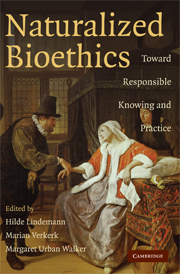Book contents
- Frontmatter
- Contents
- Contributors
- Acknowledgments
- Naturalized Bioethics
- Introduction: Groningen Naturalism in Bioethics
- I RESPONSIBLE KNOWING
- 1 Moral Bodies: Epistemologies of Embodiment
- 2 Choosing Surgical Birth: Desire and the Nature of Bioethical Advice
- 3 Holding on to Edmund: The Relational Work of Identity
- 4 Caring, Minimal Autonomy, and the Limits of Liberalism
- 5 Narrative, Complexity, and Context: Autonomy as an Epistemic Value
- 6 Toward a Naturalized Narrative Bioethics
- II RESPONSIBLE PRACTICE
- Bibliography
- Index
2 - Choosing Surgical Birth: Desire and the Nature of Bioethical Advice
Published online by Cambridge University Press: 05 June 2012
- Frontmatter
- Contents
- Contributors
- Acknowledgments
- Naturalized Bioethics
- Introduction: Groningen Naturalism in Bioethics
- I RESPONSIBLE KNOWING
- 1 Moral Bodies: Epistemologies of Embodiment
- 2 Choosing Surgical Birth: Desire and the Nature of Bioethical Advice
- 3 Holding on to Edmund: The Relational Work of Identity
- 4 Caring, Minimal Autonomy, and the Limits of Liberalism
- 5 Narrative, Complexity, and Context: Autonomy as an Epistemic Value
- 6 Toward a Naturalized Narrative Bioethics
- II RESPONSIBLE PRACTICE
- Bibliography
- Index
Summary
All is clouded by desire: as fire by smoke, as a mirror by dust.… Wisdom is clouded by desire, the ever present enemy of the wise.
– Krishna to Arjuna, Bhagavadgita, book 3Most of us, academics or laypersons, accept the straightforward and simple syllogism: scientific discovery → change or improvement in medical practices → new ethical problems → bioethical advice or solutions. While there are some cynics among us, the progression from science to practice to ethical adjustment seems logical, if not natural. But the real world, alas, is not a clean and logical place. Our tidy idea of a natural progression conceals a messy process where competing information, demands, pressures, values, and emotions interact to produce scientific discovery, new medical practices, and bioethical advice. We may prefer to see bioethics as part of a well-organized division of labor, but it is, in fact, one part of the complex world of science, medicine, and health care.
Called upon to provide reasoned and defensible advice on the ethical quandaries that emerge from this jumble, bioethicists must find a way to collect information, strip away confounding factors, and zero in on the essential dilemma. Clearing away the clutter provides clarity for bioethics, but it also obscures the social origins of the facts that are brought to bear in bioethical deliberation. When consultant bioethicists consider ethical problems associated with genetic therapy, for example, they ask about risks and benefits of the procedure, scrutinize the informed-consent process, question the effects of altered genes on the population, and consider who will and will not have access to new treatments.
- Type
- Chapter
- Information
- Naturalized BioethicsToward Responsible Knowing and Practice, pp. 42 - 64Publisher: Cambridge University PressPrint publication year: 2008
- 3
- Cited by

